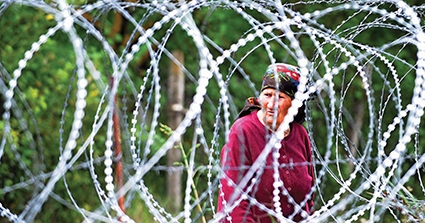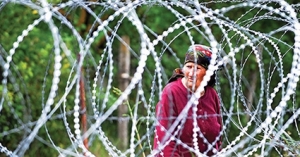MFA Reveals Gross Violation of Human Rights in Georgia’s Occupied Territories
Georgia’s Foreign Ministry (MFA) last week published a recently compiled report detailing gross human rights violations in the country’s breakaway Abkhazia and South Ossetia regions.
According to the report, numerous cases of arbitrary detentions, restrictions of movement, infringements on property rights and denying the right to receive education in a language other than Russian or Abkhaz were recorded from October-December 2015.
The report pays particular attention to the installation of barbed-wire fences across the contact line, claiming that it further aggravates the already tense situation.
It also points to new regulations on the legal status of residents classified as foreigners by the de-facto Abkhaz government.
“During the reporting period a new passport regime commenced in Abkhazia. 300,000 new documents, including 250,000 internal passports and 50,000 residence permits, are to be distributed by 1 March,” the document says.
Abkhazia’s new set of passport laws deliberately targets the region’s ethnic Georgian population by forcing them to register as foreigners and carry alien residence permits, according to Georgia’s foreign ministry.
The rebel government in South Ossetia is implementing a similar passport regime, according to the report.
The MFA says in the reporting period, Nils Muiznieks, the Commissioner for Human Rights of the Council of Europe, visited Georgia. One of the aims of the visit was to monitor the human rights situation in the occupied territories of Georgia on the ground. Despite some efforts, the Commissioner was not allowed to enter the occupied regions of Abkhazia, Georgia and the Tskhinvali region/South Ossetia.
In the ‘Freedom of Movement’ section, the report reads that people are regularly detained by the Russian FSB officers for so called “illegal border crossings” while the operating crossing points along the occupation line allow crossings only to individuals having one of the types of “documents” recognized by the occupying power and based on vague criteria as to the validity of these documents. Numerous cases were reported during the reporting period on violations of the right to freedom of movement.
The MFA appeals to the international community, states as well as international intergovernmental and non-governmental organizations to continue recognizing extensively and widely the occupation of the Georgian territories by Russia.
The main foreign structure calls on its international partners to continue calling on the Russian Federation to bear responsibility for human rights violations in the occupied regions and continue calling on the Russian Federation to remove barbed wire fences and other artificial obstacles along the occupation line.
The appeal also includes calling on the Russian Federation to allow access of the international human rights monitoring mechanisms to the occupied regions of Georgia, including the EUMM, and including humanitarian organizations.
Georgian government forces fought three wars against Russian-backed separatist forces in Abkhazia and South Ossetia between 1991-2008. The wars left thousands dead and led to the ethnic cleansing of a quarter of a million ethnic Georgians. Abkhazia and South Ossetia were recognized as independent states by Moscow following the 2008 war. International law and the United Nations continue to state that the regions remain parts of Georgia.
Zviad Adzinbaia












